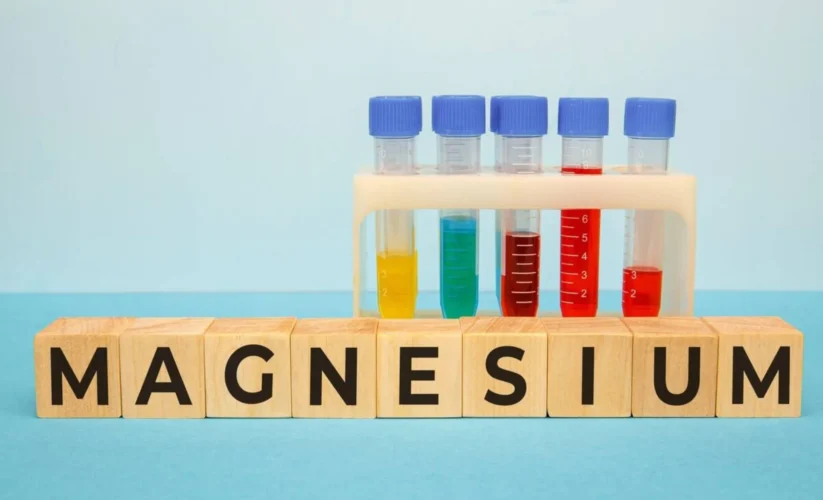
11 Warning Signs of Magnesium Deficiency
Feeling weak, tired, have muscle twitches and cramps, restless legs syndrome and eye twitches are all the common 11 warning signs of magnesium deficiency, a common and often overlooked condition. Magnesium is involved in over 300 metabolic processes in the body which makes it one of the most important minerals. A lack of magnesium levels can impact many of your body’s processes. There are 11 warning signs of magnesium deficiency that you don’t have enough of it and ways to treat it before it gets worse.
The Importance of Magnesium
Many times, people ask why it’s crucial to recognise the 11 Warning Signs of Magnesium Deficiency. The answer is that magnesium is essential for many bodily functions, including blood pressure management, protein synthesis, and muscle and neuron function. Many people’s diets do not contain enough magnesium, despite its importance. A magnesium deficit may result from a number of factors, including poor food choices, stress, and specific medical disorders. You may determine whether you could be deficient in this vital mineral by looking for the 11 Warning Signs of Magnesium Deficiency.
11 Warning Signs of Magnesium Deficiency

Muscle Cramps: One of the most common 11 warning signs of magnesium deficiency is muscle cramps. If you experience frequent muscle cramps, especially in your legs, it could be a sign that your magnesium levels are low.
Fatigue: another 11 Warning Signs of Magnesium Deficiency is Feeling constantly tired and lacking energy can be a symptom of magnesium deficiency. Magnesium plays a crucial role in converting food into energy, so a lack of this mineral can leave you feeling drained.
Weakness: Muscle weakness or a general feeling of weakness may indicate that your magnesium levels are low if you are Experiencing these then this is another 11 Warning Signs of Magnesium Deficiency you should look out for. Without enough magnesium, muscles may not function as well as they should.
One of the common 11 Warning Signs of Magnesium Deficiency is irregular heartbeat rates. This one is also erratic. Keeping your heart beat in a healthy range requires magnesium. You may require additional magnesium in your diet if you suffer from palpitations or irregular heartbeats.
High Blood Pressure: Low magnesium levels have been linked to high blood pressure. If you have unexplained hypertension, it may be worth checking your magnesium levelsas this is yet another 11 Warning Signs of Magnesium Deficiency.
Migraines: if you are Experiencing frequent migraines then it is one the common 11 Warning Signs of Magnesium Deficiency you are Experiencing. Magnesium deficiency has been associated with migraines and headaches. Supplementing with magnesium may help reduce the frequency and severity of these episodes.
Insomnia: lack of sleep is major common sign of 11 Warning Signs of Magnesium Deficiency. Difficulty falling asleep or staying asleep could be a sign of magnesium deficiency. Magnesium is known to help relax the nervous system and promote better sleep.
Anxiety: Studies have shown that magnesium plays a role in regulating neurotransmitters that are linked to anxiety. If you experience excessive worry or nervousness watching out this 11 Warning Signs of Magnesium Deficiency can help you consult healthcare professional at a ear, it may be due to low magnesium levels.
Poor Memory: Magnesium is important for cognitive function, and low levels of this mineral may affect memory and concentration. If you find yourself forgetting things often, it could be related to magnesium deficiency.
Digestive Problems: Magnesium aids in controlling the contraction of the muscles in the digestive system. Digestion issues such as constipation can result from a deficiency of magnesium.
Joint Pain: the 11 warning signs of Magnesium deficiency has been linked to joint pain and inflammation. If you suffer from achy joints, it may be worth considering if your magnesium levels are adequate.
Conclusion

Magnesium deficiency is a common issue that can have a significant impact on your health and well-being. By recognizing the 11 warning signs of magnesium deficiency and taking steps to address this deficiency, you can improve your overall health and feel better. If you suspect you may be lacking in magnesium, consider incorporating magnesium-rich foods into your diet or speaking with a healthcare provider about supplementation. Don’t ignore the signs – your body may be trying to tell you something important , if Are you experiencing muscle cramps, fatigue, or irregular heartbeats? Learn about the 11 warning signs of magnesium deficiency and how to address this common issue.
FAQ’s
What are the 11 warning signs of magnesium deficiency?
Muscle cramps and spasms: Magnesium plays a key role in muscle function, so deficiency can lead to cramping and spasms.
Fatigue and weakness: Low magnesium levels can result in reduced energy production, leading to feelings of fatigue and weakness.
High blood pressure: Magnesium helps regulate blood pressure, so deficiency may contribute to hypertension.
Irregular heartbeat: Magnesium is crucial for heart health, and low levels can result in irregular heartbeats.
Nausea and vomiting: Magnesium deficiency can affect digestion and lead to symptoms like nausea and vomiting.
Insomnia: Magnesium helps regulate neurotransmitters that control sleep, so deficiency may cause insomnia.
Muscle weakness: Weakness in muscles can be a sign of inadequate magnesium levels.
Personality changes: Magnesium plays a role in brain function, so deficiency may lead to mood swings or other personality changes.
Tingling or numbness: Low magnesium levels can affect nerve function, causing sensations like tingling or numbness.
Osteoporosis: Magnesium is essential for bone health, so deficiency may contribute to conditions like osteoporosis.
Migraines: Some studies suggest that magnesium deficiency may be linked to the onset of migraines.
How do you feel when your magnesium is low?
When your magnesium levels are low, you may experience symptoms such as muscle cramps, tremors, weakness, fatigue, and irritability. Low magnesium can also lead to mood changes like anxiety and depression, as well as difficulty sleeping. It’s essential to maintain adequate magnesium levels in the body to support proper muscle and nerve function, energy production, and overall well-being. If you suspect you have low magnesium levels, it’s important to consult with a healthcare provider for proper diagnosis and treatment.
What diseases cause magnesium deficiency?
Magnesium deficiency can be caused by various diseases and conditions that affect the body’s ability to absorb or retain magnesium. Some common diseases that can lead to magnesium deficiency include gastrointestinal disorders such as Crohn’s disease, celiac disease, and chronic diarrhea. Other conditions like diabetes, alcoholism, and hyperthyroidism can also result in magnesium deficiency due to increased urinary excretion or insufficient intake. Additionally, certain medications and treatments such as diuretics, proton pump inhibitors, and chemotherapy can interfere with magnesium absorption in the body. It is important to consult a healthcare provider to determine the underlying cause of magnesium deficiency and develop an appropriate treatment plan.





